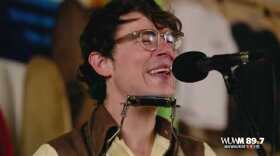June 18th is Paul McCartney’s 72nd birthday. It was almost a year ago when the former Beatle and his band played a triumphant concert in front of Miller Park’s biggest crowd ever.
That was a far cry from where McCartney was as the 1970s opened. As we learn in Tom Doyle’s new biography, Man on the Run: Paul McCartney in the 1970s, the time immediately after the Beatles’ demise was marked by a side of Paul McCartney few people could imagine.
"He is twenty-seven years old, and he's suddenly redundant," Doyle says. "He has no job, but he can't announce this to the world. And I suppose that's one of the interesting things about him musically throughout the decade - in the 1970s, he didn't have a map. Who knows where this guy was going, musically?"

Doyle has interviewed McCartney extensively since 2006. He relies on those interviews, plus conversations with McCartney's former bandmates with Wings, and other contemporaries in chronicling a turbulent decade.
McCartney's first non-Beatles release (called simply, "McCartney") came out just as the Beatles' final album, "Let It Be," was being released. The reviews of that and his next two albums were mixed. It was the 1973 Paul McCartney and Wings album, "Band on the Run," which returned him to musical stardom.
Still, Doyle believes some of the earlier work that was shunned by critics is worth revisiting today. "I suppose it was an easy thing for critics to 'lay the boot' into him, as we say in Scotland," Doyle says. "But it's 'Ram' (McCartney's second album) that, to me, is the true successor to (The Beatles') 'Abbey Road'." Doyle points to the record's 'flights of fancy' - "it's his 1970s true masterpiece," he says.
But even as he was creating new musical classics, the decade had plenty of challenges for McCartney - his band, Wings, went through multiple wholesale changes, he faced repeated legal charges for marijuana possession, and his relationship with the other members of the Beatles - especially John Lennon - thawed and cooled again.
Most remarkable, Doyle believes, is that McCartney came out of the experience relatively unscathed. "I mean it’s amazing," Doyle says, "that someone who’s lived his life at such speed and with such intensity and at such levels of fame, that he can manage to be normal at any level whatsoever."





